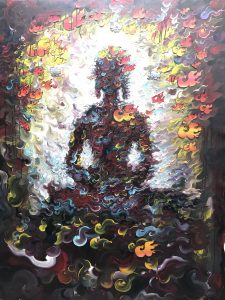 The Yogabliss, Two Rivers/River Tree Yoga on-line Moving into Meditation classes met this morning. Sundays often feel like a holiday for me – the time in my early life when going to grandma’s house was about her hugs and playing with my cousins. Our play was imaginal and improvisational. Hiding and seeking, shouting and running took us to new places. Our weekly class is a bit like those visits – I anticipate seeing your faces, hearing about your lives and the meaning you make of the world and our practice. We learn from each other and we draw comfort from each other.
The Yogabliss, Two Rivers/River Tree Yoga on-line Moving into Meditation classes met this morning. Sundays often feel like a holiday for me – the time in my early life when going to grandma’s house was about her hugs and playing with my cousins. Our play was imaginal and improvisational. Hiding and seeking, shouting and running took us to new places. Our weekly class is a bit like those visits – I anticipate seeing your faces, hearing about your lives and the meaning you make of the world and our practice. We learn from each other and we draw comfort from each other.
Today we worked with Eagle Poem by Joy Harjo. The poem is about prayer and it’s an invitation to open. Each line is almost a koan – a question you live with that doesn’t have a “right” answer. When we live with life’s questions we meet each experience with curiosity and care.
 We also drew on Rainer Maria Rilke‘s poem, Let This Darkness Be a Bell Tower. Rilke lived during the late 19th and early 20th century. He lived during the tumultuous times leading up to WWI and the devastation during and after the war. The poem is like a hymn to being consciously alive. It’s also a challenge to embrace our lives fully. Ultimately he asks us to transform our suffering into strength.
We also drew on Rainer Maria Rilke‘s poem, Let This Darkness Be a Bell Tower. Rilke lived during the late 19th and early 20th century. He lived during the tumultuous times leading up to WWI and the devastation during and after the war. The poem is like a hymn to being consciously alive. It’s also a challenge to embrace our lives fully. Ultimately he asks us to transform our suffering into strength.
In reflecting on how to go about this feat we looked to the wisdom teachings of Buddhism. First considering the teachings on love interpreted by Haemin Sunim, a Zen Buddhist teacher, writer and founder of the School of Broken Hearts in Seoul, South Korea. I learned of Haemin Sunim by listening to his interview with Dan Harris on the Ten Percent Happier podcast. He suggests that paying attention is a form of love.
 Finally we practiced with one of the Brahmaviharas: cultivating compassion as interpreted by Roshi Joan Halifax. Roshi Joan is an American Zen Buddhist teacher, anthropologist, ecologist, civil rights activist, hospice caregiver and Abbess of Upaya Zen Center. Brahmavihara is a Pali word meaning “sublime abode.” In practice this refers to four Buddhist virtues of lovingkindness, compassion, sympathetic joy, and equanimity. Cultivating these qualities is a way of opening and transforming our hearts to grow our capacity to care. You can find the full practice in Roshi’s article, The Four Boundless Abodes.
Finally we practiced with one of the Brahmaviharas: cultivating compassion as interpreted by Roshi Joan Halifax. Roshi Joan is an American Zen Buddhist teacher, anthropologist, ecologist, civil rights activist, hospice caregiver and Abbess of Upaya Zen Center. Brahmavihara is a Pali word meaning “sublime abode.” In practice this refers to four Buddhist virtues of lovingkindness, compassion, sympathetic joy, and equanimity. Cultivating these qualities is a way of opening and transforming our hearts to grow our capacity to care. You can find the full practice in Roshi’s article, The Four Boundless Abodes.
Relaxed Reflection
Eagle Poem by Joy Harjo
To pray you open your whole self
To sky, to earth, to sun, to moon
To one whole voice that is you.
And know there is more
That you can’t see, can’t hear;
Can’t know except in moments
Steadily growing, and in languages
That aren’t always sound but other
Circles of motion.
 Like eagle that Sunday morning
Like eagle that Sunday morning
Over Salt River. Circled in blue sky
In wind, swept our hearts clean
With sacred wings.
We see you, see ourselves and know
That we must take the utmost care
And kindness in all things.
Breathe in, knowing we are made of
All this, and breathe, knowing
We are truly blessed because we
Were born, and die soon within a
True circle of motion,
Like eagle rounding out the morning
Inside us.
We pray that it will be done
In beauty.
In beauty.
Entering this opening of awareness . . . opening your whole self . . . accepting the breath truly just as it is . . . Nonjudgmental openness transforming breath awareness . . . breath becoming an instrument of self understanding and healing . . . We open to all this to the known and unknown . . . and to the one voice that is you . . . however it arises . . . speaking in a language without sound . . . letting itself be known as you let the body breathe.
This is our practice . . . we take the utmost care and kindness with all things . . . body, breath, sensation, emotion, thought . . . we take the utmost care and kindness with all beings . . .
Once you feel those circles of motion settling you can take a few deep breaths and then just let them go . . . relax into the support of the earth. . . See if you can open to Rilke’s invitations in:
Let This Darkness Be a Belltower
Quiet friend who has come so far,
feel how your breathing makes more space around you.
 Let this darkness be a bell tower
Let this darkness be a bell tower
and you the bell. As you ring,
what batters you becomes your strength.
Move back and forth into the change.
What is it like, such intensity of pain?
If the drink is bitter, turn yourself to wine.
In this uncontainable night,
be the mystery at the crossroads of your senses,
the meaning discovered there.
And if the world has ceased to hear you,
say to the silent earth: I flow.
To the rushing water, speak: I am.
We are also battered, moving “back and forth into the change.” So how do we become the bell so that what batters us makes us stronger? How do we become “the mystery at the crossroads of [our] senses?” Can we affirm to the silent earth and the rushing water: I flow . . . I am?
We can look to some of the wisdom teachings from which the practice of meditation springs. Haemin Sunim talks about his definition of love:
I think one of the wonderful expressions of love is paying attention. When you are in love with something, when you love your child, . . . when you love whatever that you’re loving, then you pay attention. And when you are paying attention . . . you don’t think about yourself. Like when you are looking at your . . . baby . . . sleeping at night, . . . there is a feeling of warmth and love and . . . at that moment, you are . . . only paying attention to your [baby]. You are not thinking about your thoughts. It’s just so when our minds become quiet and . . . pay attention to whatever that is, . . . in that moment there is a quality of love. . . .
 Just as breathing makes more space around you . . . paying attention is a way of loving. Right now we can reflect on the last time we true attended to someone or something . . . a moment of feeling warmth and love . . . only paying attention. This is perhaps the most fundamental way of turning bitterness into wine as Rilke writes.
Just as breathing makes more space around you . . . paying attention is a way of loving. Right now we can reflect on the last time we true attended to someone or something . . . a moment of feeling warmth and love . . . only paying attention. This is perhaps the most fundamental way of turning bitterness into wine as Rilke writes.
Along with cultivating loving attention we can cultivate loving kindness, compassion, sympathetic joy and equanimity. Roshi Joan describes these virtues:
. . . They are medicine for a world in turmoil. They remind us not to polarize. They give us strength to meet adversity of any kind, whether physical illness, social illness or environmental illness. . . .
We begin working with these qualities within ourselves in order to be of benefit to others. Traditionally we use phrases like invocations for deep goodness to be directed toward yourself, someone who has been kind to you, a person you dislike, and a person you don’t know. You can also send to a group, a nation, or to another species. Roshi Joan suggests:
. . . maybe this practice is about calling forth “our better angels.” . . .
These phrases can connect us to the stream of deep goodness that is within the human heart, no matter how complicated, unhappy, or mean a person is, how fraught a country might be, or how indifferent an institution might be.
They can connect us to one another or to a greater sense of possibility, even when things are very tough.
Let’s try working with the phrases for compassion as Roshi Joan describes. See if you can let yourself take in what you are hearing without trying or forcing anything. See if you can let yourself be carried along by the practice.
You can start by reflecting on your experiences of difficulty in these troubled times it could be you’re struggling right now . . . Recall what you were feeling in those moments of disappointment, fear or sadness. . . See if you can open your heart letting it be filled with compassion . . . Now see if you can open to these phrases:
 May [I] transform any pain and suffering [I am] experiencing at this time.
May [I] transform any pain and suffering [I am] experiencing at this time.
May [I] be free from anger, fear, and worry.
May [I] be open to receive other’s love and compassion.
May [I] be filled with compassion for [myself] and others.
May [I] see [my] own limits compassionately, just as [I] view the suffering of others.
[And now], reflect on one person, whom you might or might not know personally, whom you feel is truly compassionate. Maybe a doctor or nurse who lovingly took care of you when you were ill; maybe a saint-like person who is well-known. Let yourself resonate with this person and allow the sensibility of compassion to fill and expand your heart.
May you transform any pain and suffering you are experiencing at this time.
May you be free from anger, fear, and worry.
May you be open to receive other’s love and compassion.
May you be filled with compassion for yourself and others.
May you see your own limits compassionately, just as you view the suffering of others.
Roshi Joan offers us this encouragement:
 These practices are about nourishing balance and tenderness in your life.
These practices are about nourishing balance and tenderness in your life.
Your open heart allows you to perceive and be touched by others.
Your strength lets you uphold yourself in the midst of any conditions.
Sit with this sense of openness, tenderness, and caring toward others, and as well feel the support of your strong back.
Through your strong back, which lends you equanimity, you have the strength to be with whatever is present.
. . . Hold in your mind and heart the sense that all beings and things are connected to one another, and this practice is about opening your life to others and to your own good heart.
